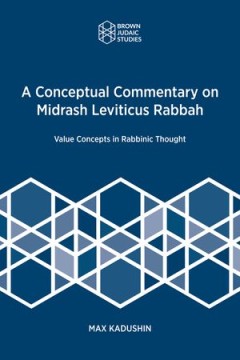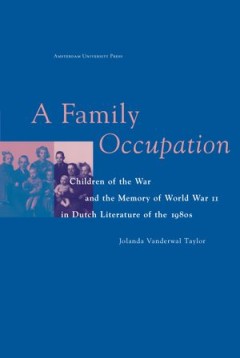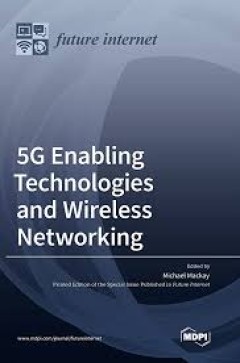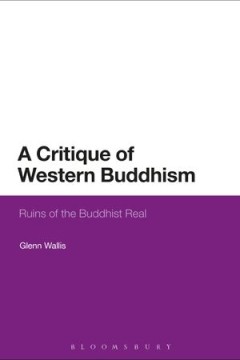Filter by

A Conceptual Commentary on Midrash Leviticus Rabbah : Value Concepts in Jewis…
In this book Kadushin offers a running commentary on sections of Leviticus Rabbah. His goal is not only to explicate individual sections of this Late Antique midrashic work, but also to highlight the basic conceptual framework within which the rabbis worked. Kadushin's commentary highlights the indeterminacy of belief and the genuine emphatic trends that distinguish rabbinic Judaism while also …
- Edition
- -
- ISBN/ISSN
- 9781946527233
- Collation
- 271 hlm
- Series Title
- -
- Call Number
- -

A History of the Mishnaic Law of Agriculture: Kilayim: Translation and Exegesis
This volume presents a translation and exegesis of Mishnah's Tractate Kilayim (Mixed Species) in an effort to discover the original meaning of the tractate. This volume aims to identify the sense which the formulators of the tractate's laws wished their rules to convey.
- Edition
- -
- ISBN/ISSN
- 9781951498344
- Collation
- -
- Series Title
- -
- Call Number
- -

Afterlives of the Garden
The collection of essays in this volume offers fresh insights into varied modalities of reception of Epicurean thought among Roman authors of the late Republican and Imperial eras. Its generic purview encompasses prose as well as poetic texts by both minor and major writers in the Latin literary canon, including the anonymous poems, Ciris and Aetna, and an elegy from the Tibullan corpus by the …
- Edition
- Sergio Yona
- ISBN/ISSN
- 9783111029733
- Collation
- 190
- Series Title
- CICERO
- Call Number
- -

Afrikaners and the boundaries of faith in post-apartheid South Africa
This book examines the shifting moral and spiritual lives of white Afrikaners in South Africa after apartheid. The end of South Africa’s apartheid system of racial and spatial segregation sparked wide-reaching social change as social, cultural, spatial and racial boundaries were transgressed and transformed. This book investigates how Afrikaners have mediated the country’s shifting boundari…
- Edition
- -
- ISBN/ISSN
- 9781003185574
- Collation
- 195
- Series Title
- Routledge Contemporary South Africa
- Call Number
- -

A Family Occupation : Children of the War and the Memory of World War II in D…
Many of today's Dutch writers were children during World War II. Even today, the traumatic childhood experience of enemy occupation is still central to the work of many of them. This interest cuts across the traditional boundaries between fiction, autobiography and the literature of trauma and recovery. A Family Occupation is the first English-language introduction to Dutch-language texts writt…
- Edition
- -
- ISBN/ISSN
- 9789053562369
- Collation
- 208 halaman
- Series Title
- -
- Call Number
- 800 TAY f

Abu Zayd AlBalkhi’s Sustenance of the Soul
Al-Balkhi explains symptoms and treatments giving advice on preventive measures and how to return the body and soul to their natural healthy state. In doing so he displays a keen understanding of the human condition and the medical nature of the human emotional state. An astonishing feat given that many of the conditions he discusses were left largely unknown and untreated for centuries before …
- Edition
- -
- ISBN/ISSN
- 9781565645035
- Collation
- oer.unej.ac.id
- Series Title
- -
- Call Number
- Cognitive behavioural therapy

1. Uluslararası Prof. Dr. Fuat Sezgin İslâm Bilim Tarihi Sempozyumu Bildir…
Within the scope of the events of the 2019 Prof. Dr. Fuat Sezgin Year, under the auspices of our Presidency and with the support of the Ministry of Culture and Tourism, in partnership with Istanbul University, Fatih Sultan Mehmet Foundation University, and the Fuat Sezgin Islamic Science History Research Foundation, we had the honor of hosting the first International Prof. Dr. Fuat Sezgin Sympo…
- Edition
- -
- ISBN/ISSN
- 978-605-07-0752-6
- Collation
- -
- Series Title
- -
- Call Number
- -

5G Enabling Technologies and Wireless Networking
The ongoing deployment of 5G networks is a key enabler for realizing upcoming services at scale, including the massive deployment of the Internet of Things, providing communications to support autonomous vehicles, and supporting the realization of smart cities. However, as the limitations of existing approaches become apparent, the need for next-generation technologies is growing, in terms of i…
- Edition
- -
- ISBN/ISSN
- 9783036568065
- Collation
- -
- Series Title
- -
- Call Number
- -

A Critique of Western Buddhism : Ruins of the Buddhist Real
What are we to make of Western Buddhism? Glenn Wallis argues that in aligning their tradition with the contemporary wellness industry, Western Buddhists evade the consequences of Buddhist thought. This book shows that with concepts such as vanishing, nihility, extinction, contingency, and no-self, Buddhism, like all potent systems of thought, articulates a notion of the “real.” Raw, unflinc…
- Edition
- -
- ISBN/ISSN
- 9781474283557
- Collation
- 232 hlm
- Series Title
- -
- Call Number
- -

Abrahamic Reflections on Randomness and Providence
This open access book addresses the question of how God can providentially govern apparently ungovernable randomness. Medieval theologians confidently held that God is provident, that is, God is the ultimate cause of or is responsible for everything that happens. However, scientific advances since the 19th century pose serious challenges to traditional views of providence. From Darwinian evolut…
- Edition
- -
- ISBN/ISSN
- 9783030757977
- Collation
- oer.unej.ac.id
- Series Title
- -
- Call Number
- -
 Computer Science, Information & General Works
Computer Science, Information & General Works  Philosophy & Psychology
Philosophy & Psychology  Religion
Religion  Social Sciences
Social Sciences  Language
Language  Pure Science
Pure Science  Applied Sciences
Applied Sciences  Art & Recreation
Art & Recreation  Literature
Literature  History & Geography
History & Geography